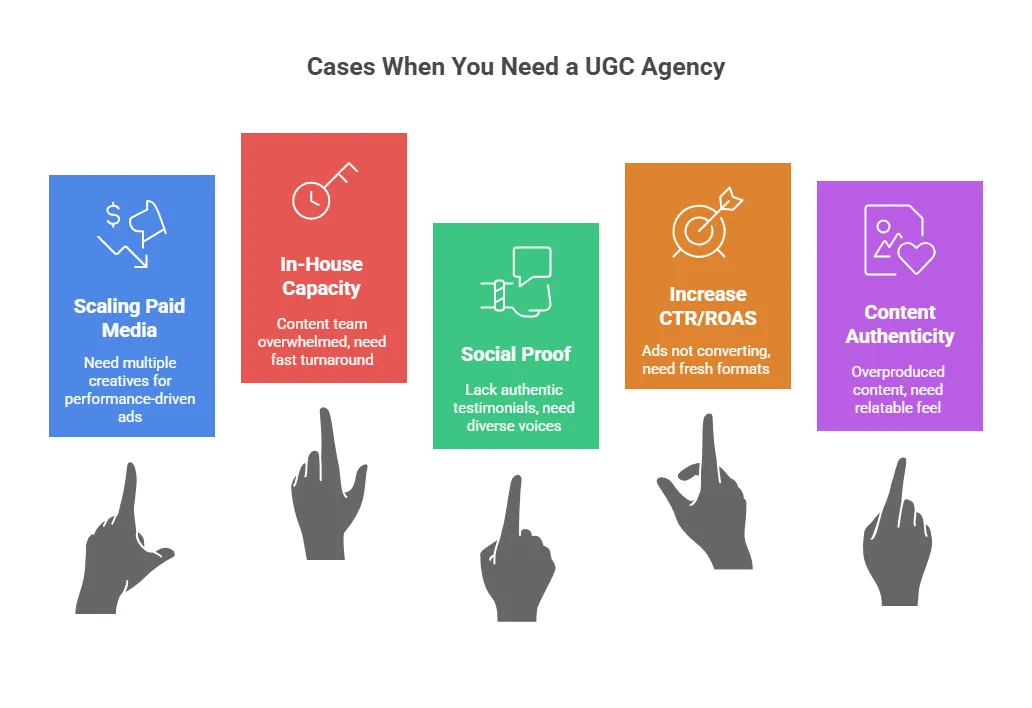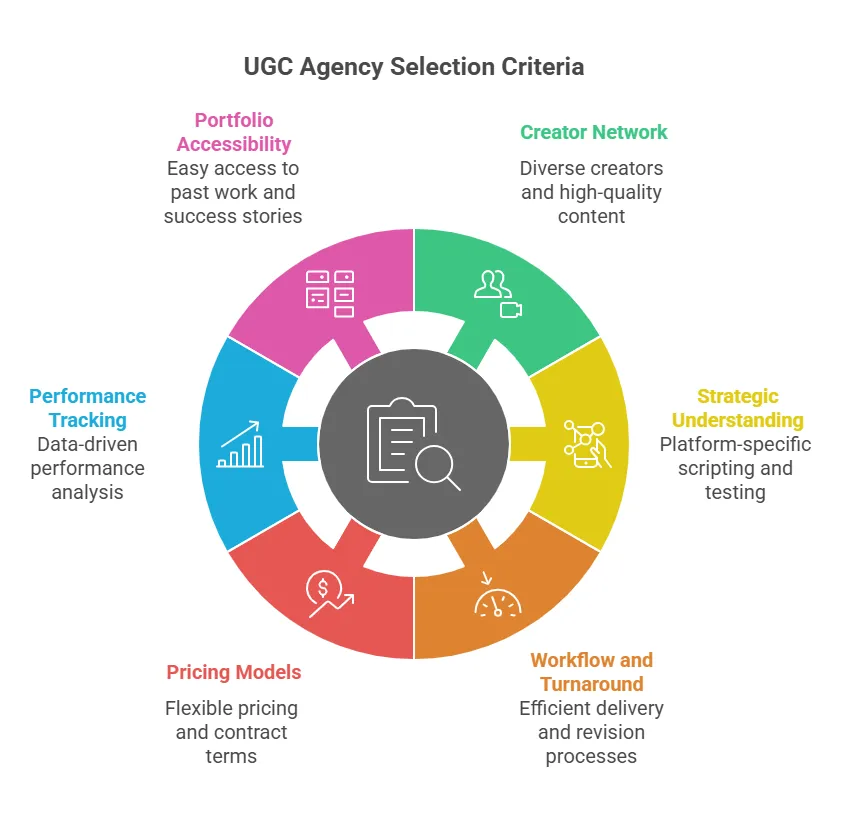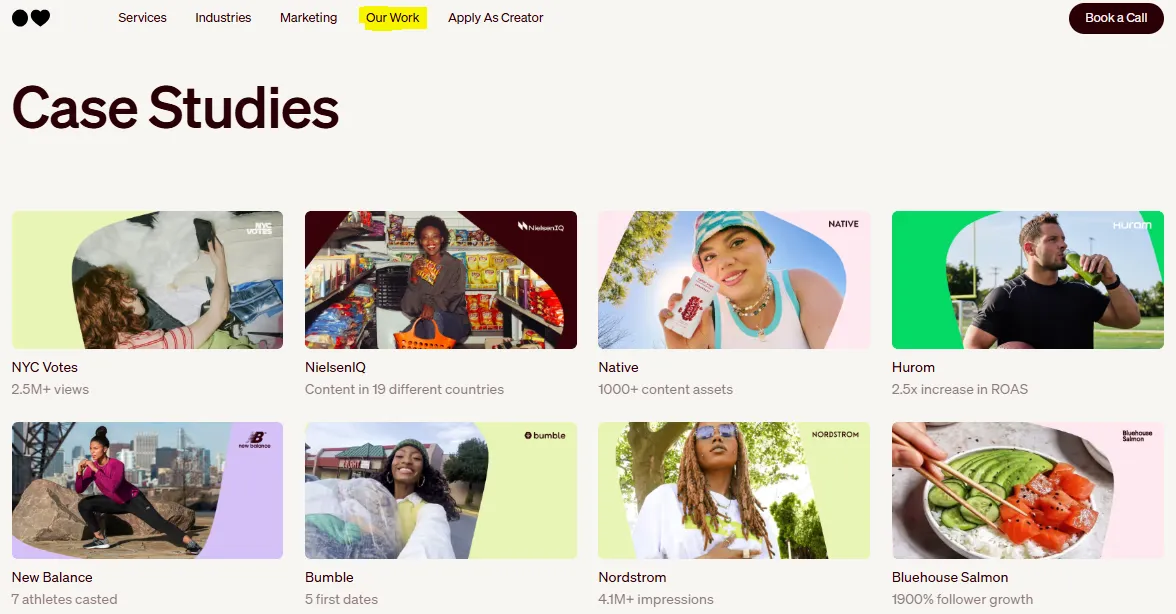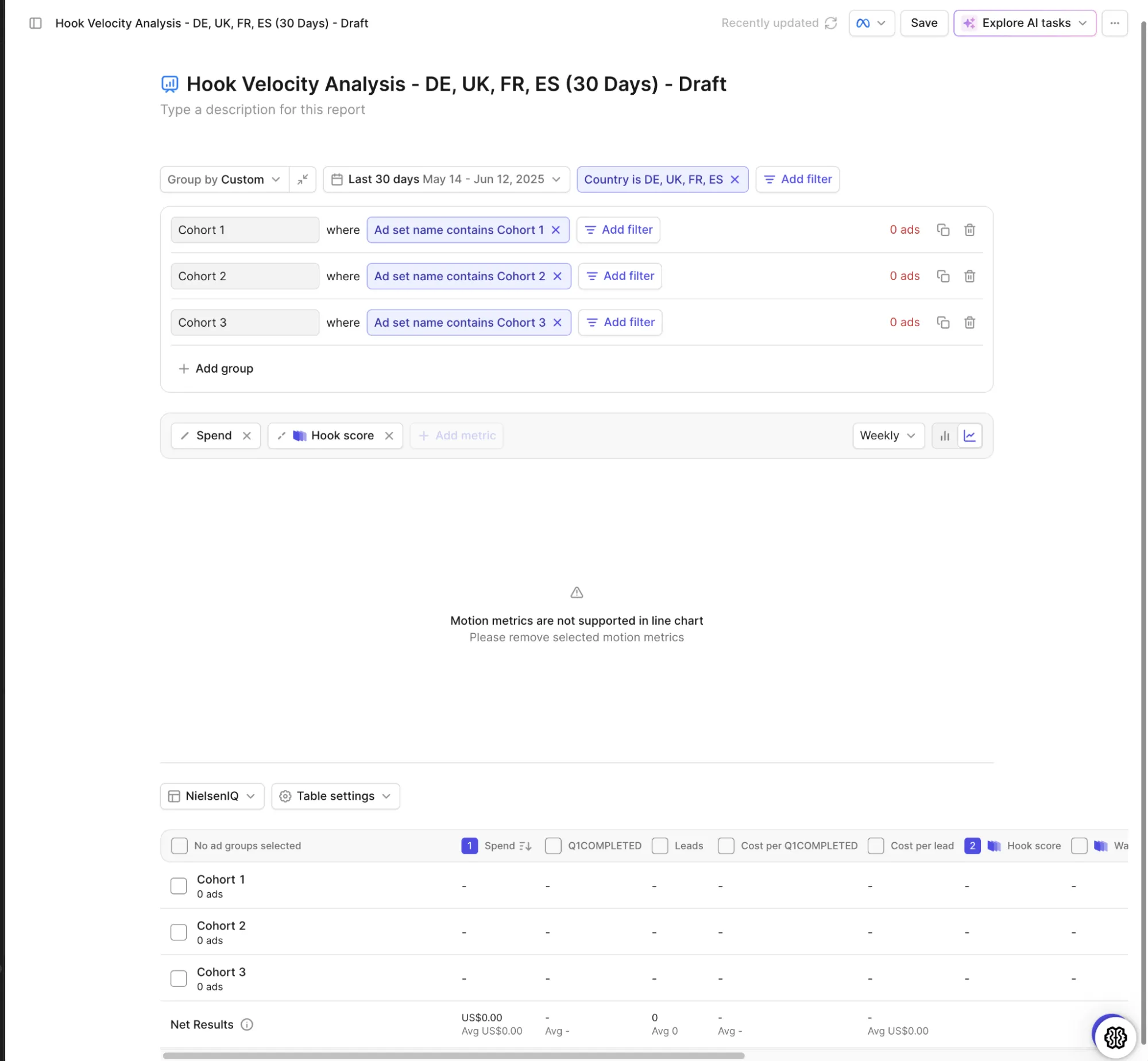If you’ve already made up your mind to invest in UGC but don’t have the time, tools, or team to manage it in-house, don’t worry.
UGC is no longer optional for performance brands. 75% of marketers say it feels more authentic than branded content, and authenticity drives clicks, saves, and conversions.
But finding the right agency to handle it all? That’s the hard part. Between vague pricing, generic portfolios, and confusing contracts, it’s easy to end up with content that looks nice but doesn’t convert.
In this guide, we’ll cover:
P.S. Spending more time managing creators than launching campaigns? Let the experts take the weight off. UGC expert agencies like inBeat handle everything from sourcing, scripting, revisions, usage rights, and performance tracking, so your team can stay focused on growth. Book a free strategy call now and get high-performing UGC delivered on autopilot.
UGC (User-Generated Content) is critical for brands: It’s more authentic, cost-effective, and delivers higher conversions than traditional branded ads.
Hire a UGC agency when: You’re scaling paid ads, your internal team is stretched, you lack authentic social proof, ad results are dropping, or your content feels overproduced.
A good UGC agency offers:
Key questions to ask agencies:
Red flags: No clarity on rights, no performance data, slow timelines, outdated work, or vague processes.
Why agencies beat freelancers: Agencies offer strategy, management, scale, tracking, legal clarity, and creator access. Freelancers can’t match this for fast-moving paid campaigns.
Legal risks: Always secure clear usage rights in contracts to avoid copyright or licensing issues.
Best platforms for UGC: TikTok, Instagram Reels, Meta, YouTube Shorts. Content should look native, not like ads.
UGC vs. Influencer content: UGC is made for your brand’s use; influencer content is posted on creators’ profiles. Always get proper rights before using UGC in paid ads.
Pro tip: Look for an agency that handles strategy, scripting, creator management, and delivers ready-to-use content on autopilot.
Summary: Choose a UGC agency with proven expertise, transparent terms, and platform-specific knowledge. Ask smart questions, watch for red flags, and always get legal usage rights. The right partner makes UGC easy, scalable, and effective for your brand.
A UGC agency helps brands create social media content through real people, creators who produce videos and posts that feel natural, not scripted. Instead of polished ads, the focus is on relatable clips that look like they came from actual customers.
These agencies manage everything from casting creators to editing and delivery. By collaborating with a UGC agency, you receive a steady flow of short-form video ads, product reviews, TikToks, voiceovers, testimonials, and lifestyle shots. Each piece is built to fit the platform's mechanics while staying true to the brand.
If you're building a DTC brand, scaling an eCommerce store, or growing a SaaS or mobile app, bringing in a UGC agency at the right time can save you from creative bottlenecks, inconsistent results, and wasted ad spend.
And here’s the best part, UGC is also cost-effective. As per a 2025 survey, 93% of marketers said UGC outperformed traditional branded content.
Even better, brands spent just $178 per UGC creator on average. That’s 80% cheaper than working with YouTube influencers, 54% less than Instagram, and 53% less than TikTok.
So, when exactly should you team up with a UGC agency? Let’s break it down.

Once your brand starts running TikTok ads, Meta campaigns, or Instagram placements, content becomes your biggest variable. One or two videos won’t carry an entire strategy. You need volume and variety to prevent performance from slipping.
A UGC agency helps you deliver content that’s built to convert. Each video comes with a strong hook, clear CTA, and a visual style that holds attention. Scroll-stopping assets make it easier to test new angles, refresh fatigued ads, and stay competitive across paid channels.
When campaigns pick up speed, your internal team can only do so much. Between video shoots, edits, revisions, and last-minute ad changes, it’s easy for content workflows to get jammed. That delay slows down campaign management and makes it harder to meet deadlines.
A UGC agency steps in with a ready-made system. You get quick turnarounds, creator management, and ad-ready content without piling more work on your internal team. It’s a simple way to stay consistent across social media platforms while keeping your content strategy moving forward.
If your product pages lack testimonials, try‑on videos, or unboxing clips, this could hurt conversions. Shoppers want to see everyday users engaging with the product.
Research shows 93% of customers find UGC ratings and reviews very helpful when deciding what to buy. Video testimonials are even more powerful; viewers remember 95% of what they see and hear compared to just 10% of text-based reviews. That shows how authentic UGC builds deeper trust and drives action.
Here’s a strong example from Prose, created in collaboration with the UGC agency inBeat:
A UGC agency brings you testimonial videos, voiceovers, lifestyle shots, and diverse creator voices that speak directly to your audience. It keeps content genuine and builds trust in ways that branded ads just can’t match.
As Dylan Duke, former Forbes Councils member, put it:
“UGC gives customers a unique opportunity to participate in a brand’s growth instead of being a spectator. This influences brand loyalty and affinity in a big way because people thrive off being part of something greater than themselves, and creating UGC allows them to be part of a brand’s community.’’
When ad performance starts slipping, it’s usually a sign your creative needs a refresh. Even the best targeting can’t fix stale visuals or recycled content. To improve results, you need new formats that give your audience something fresh to engage with.
That’s where user-generated content makes a real difference.
UGC-based ads generate 4x higher click-through rates and 50% lower cost-per-click compared to traditional branded content. You get content designed for conversions, backed by data-driven insights and aligned with your paid advertising strategy.
A UGC agency helps you build a creative pipeline that supports A/B testing, landing page experiments, and full-funnel performance without slowing momentum.
Read Next: UGC Ads for Higher ROAS: Examples + Tips
Studio‑perfect videos can look clean on your page, but they often miss the mark on social media. Younger audiences scroll past polished ads that feel staged and impersonal.
Gen Z especially values authenticity. A recent study found 61% of Gen Z prefer UGC over other types of content, and 35% believe it’s more credible than traditional ads. That kind of connection can’t come from a glossy studio shoot.
A UGC agency brings in creators whose videos feel real from the first second, authentic voices, unboxing clips, and lifestyle shots that blend into TikTok feeds and Instagram Reels.
Picking the right UGC agency goes beyond content production. The best partners understand your audience, your goals, and how each platform works. Besides delivering videos, they also help you shape a content strategy that drives performance across paid and organic channels.

A good UGC agency gives you access to a wide pool of creators, different ages, backgrounds, and niches that reflect your actual customer base. This diversity helps your content feel more relatable across social media platforms.
Look for agencies that consistently deliver realistic, scroll-stopping video ads that blend into feeds without looking forced or overproduced.
A strong UGC agency builds content using performance data instead of relying on assumptions. They know how to script for TikTok ads, Meta placements, YouTube Shorts, and Reels, adapting each format to match platform behavior and how users engage.
The right partner knows how to frame a hook in the first 3 seconds, place the CTA at the right moment, and prep assets for Spark Ads or Meta Advantage+ delivery. When an agency can explain why certain creatives outperform others, it shows they understand both storytelling and ad performance.
Speed matters when you're scaling paid ads. A reliable UGC agency should deliver fully edited video ads in 7–10 days or less, not weeks. Ask how they handle revisions: do they offer two rounds, or charge extra after the first cut?
Also, check how they manage the process. Good agencies use platforms like Notion, Trello, Slack, ClickUp, or custom dashboards to keep briefs, feedback, raw footage, and approvals in one place. That kind of structure saves time, reduces back-and-forth, and keeps your ad pipeline moving without delays.
Every agency prices differently, so it’s important to get clear on the structure. Some charge per video, while others work on monthly retainers or campaign bundles. Ask what’s included. Are strategy calls, revisions, and creative briefs part of the package?
More importantly, check for hidden fees tied to licensing, usage rights, or content duration. You should know if you're getting full ownership of raw files or limited access to edited clips. The best UGC agencies offer clear terms, flexible options, and contracts that scale with your content needs.
If an agency can’t show how their content performs, it’s a red flag. Ask to see data from past UGC campaigns, how did their video ads impact CTR, ROAS, or conversion KPIs? Real performance insights matter more than a flashy content portfolio.
Some UGC agencies even track performance post-delivery, especially if they're plugged into your Meta Business Manager or TikTok Ads account. Others use dashboards to report how different creatives perform across ad sets. Either way, look for a partner who treats UGC like a growth tool, instead of just a deliverable.
Before you sign anything, ask to see the agency’s recent work. A good UGC partner should share a well-organized content portfolio with examples across platforms and product types.
You must see if they understand how to tailor content for TikTok’s raw vibe, Instagram’s polished tone, or YouTube Shorts' punchy pacing. Look for creative range across industries like skincare, mobile apps, and consumer packaged goods (CPG). The ability to adapt storytelling to different audiences and categories is what sets strong agencies apart.
Expert agencies like inBeat share their work portfolios publicly, along with performance results tied to specific campaigns.

Not all UGC agencies work the same way. Some deliver volume but no strategy. Others offer quality content but fall short when it’s time to scale performance. When you ask the right questions upfront, it helps you avoid mismatched expectations and wasted spend.
Let’s explore what to ask when you’re ready to vet a serious partner:
1. What platforms does your UGC perform best on, and why?
Ask how they optimize for different channels. TikTok’s algorithm rewards raw storytelling, while Meta needs faster-paced content with bold hooks. If they say “we make content for every platform,” dig deeper.
2. Can you show a before-and-after ROAS comparison from a past campaign?
A legit agency should show results like “ROAS increased from 1.3x to 2.9x in 14 days after launch.” Ask for industry examples that match your niche, not generic claims.
3. How do you test different hooks or creatives within a single campaign?
Look for a structured testing approach: A/B testing via TikTok Ads Manager or Meta Experiments, versioning for thumbnails and intros, and even landing page experiments tied to each video.
Here’s an example of hook velocity analysis performed by the creative strategists at inBeat Agency:

4. Do your creators actually use the product on camera?
Ask how they handle product seeding campaigns. Are creators given time to try it before filming? Real usage beats staged demos. You want unboxing videos, reactions, and try-ons that feel unrehearsed.
5. How do you match creators to our target audience or product vertical?
Ask about their internal casting filters. Do they use a creator marketplace or first-party Influencers Network? Can they target Gen Z skincare buyers vs millennial CPG shoppers?
6. What usage rights are included, and how long can we run the ads?
Get specific on commercial licensing, duration, and territory. Does pricing include paid usage across Meta and TikTok? Can you use the content in whitelisting or influencer marketing campaigns?
7. What’s your turnaround time for a 3-video test batch?
A solid agency delivers edited, ready-to-run UGC video ads within 7–10 business days. If it takes longer, ask why. Delays can break creative momentum in fast-moving campaigns.
8. Do you provide platform-native formats like TikTok Spark Ads or Reels-ready files?
You should receive vertical 9:16 exports, subtitles burned in, and files labeled for quick upload. For TikTok Spark, ask if they use creator-linked posting IDs. If not, you’ll need to post as dark ads.
9. What’s your revision process if something doesn’t match the brief?
Do they include 1–2 rounds of edits? Is the feedback handled inside a tool like Trello or Notion? A clear revision policy avoids friction and keeps campaign management clean.
10. How do you measure campaign success beyond likes and views?
Surface-level metrics don’t tell the full story. The best agencies track conversion KPIs like click-through rate (CTR), cost per acquisition (CPA), return on ad spend (ROAS), add-to-cart rate, and post-click engagement.
Some also look at content funnel performance, how each UGC ad moves users from scroll to purchase or sign-up. These insights help you double down on what actually drives results, not what gets the most likes.
If an agency shows any of these signs, proceed with caution, or don’t proceed at all.
Freelancers can be a good starting point, but when you’re scaling paid campaigns or need consistent performance content, working with a UGC agency brings a lot more to the table.
Here’s what sets agencies apart from solo creators:
Without clear permissions, you can face real legal risk. For example, in 2020, Volvo was sued by photographer Jack Schroeder and model Britni Sumida after using a story on Instagram without securing rights or attributing the content properly.
Lawsuits like this aren’t unusual; rights and likeness claims can lead to costly settlements or damaged reputation.

That’s why working with an agency backed by a solid UGC contract is more than a checkbox, it protects you from legal headaches and keeps your marketing clean.
Finding the right UGC agency can feel overwhelming when every option looks the same on the surface. But what actually matters is how well they understand your brand, your audience, and your performance goals.
The right agency becomes a creative engine that delivers scroll-stopping content that feeds your paid campaigns, landing pages, and content funnels with zero friction.
Key takeaways
If you're looking to partner with a UGC agency that delivers strategy, speed, and scale, inBeat UGC experts can help. From creator management to ad-ready content, we build systems that perform.
How much does a UGC agency charge?
Pricing depends on scope, volume, and licensing. Some charge per video ($200–$500), others offer monthly packages starting around $2,000. Always ask what’s included strategy, revisions, usage rights, and raw files.
What platforms work best for UGC content?
UGC performs best on TikTok, Instagram Reels, Meta Ads, and YouTube Shorts. These platforms favor native-looking, authentic content that blends into the feed and grabs attention fast.
What’s the difference between UGC and influencer content?
UGC is content created for your brand, often without posting to the creator’s profile. Influencer content involves sponsored posts from creators with their own audiences. UGC is built for reuse in ads, pages, and campaigns.
Can I use UGC in paid ads legally?
Yes, but only with the right usage rights. A proper UGC contract should cover licensing, duration, platforms, and permissions. Using content without clear rights can lead to legal issues or take-downs.
